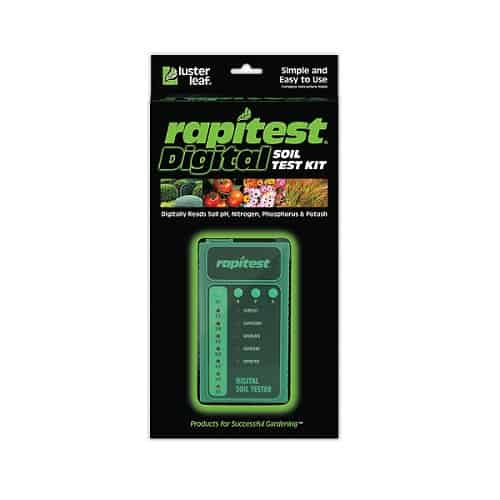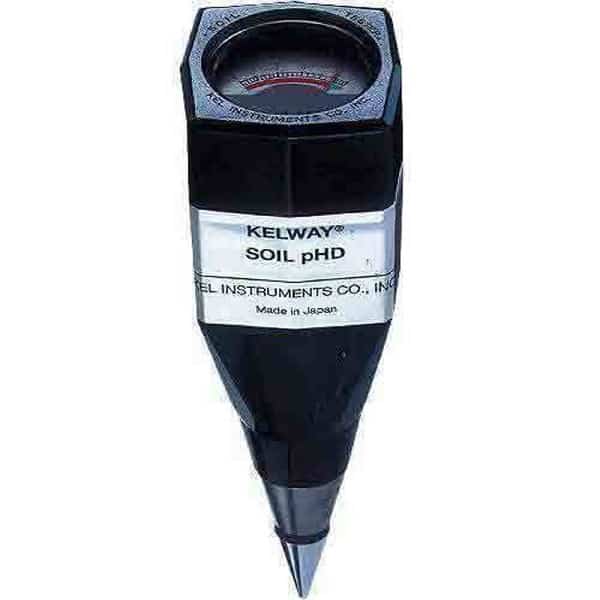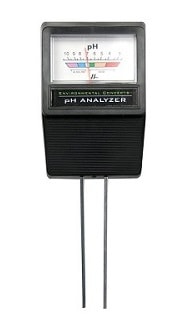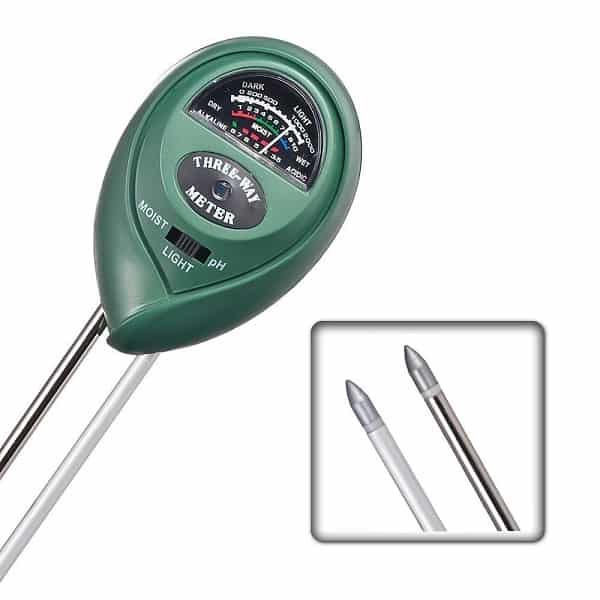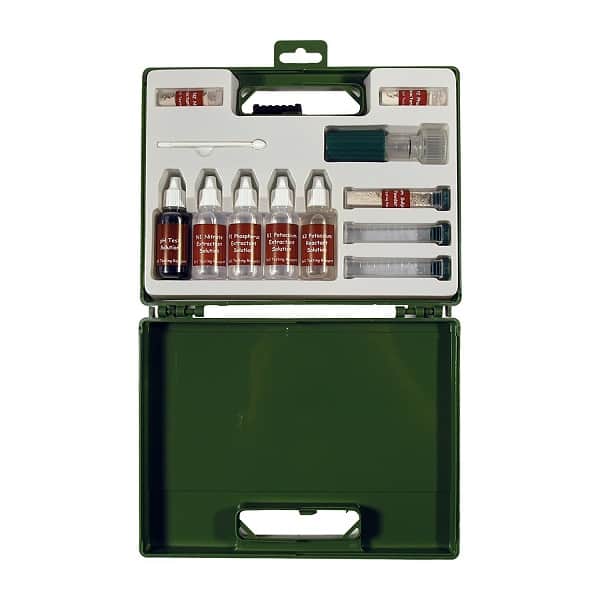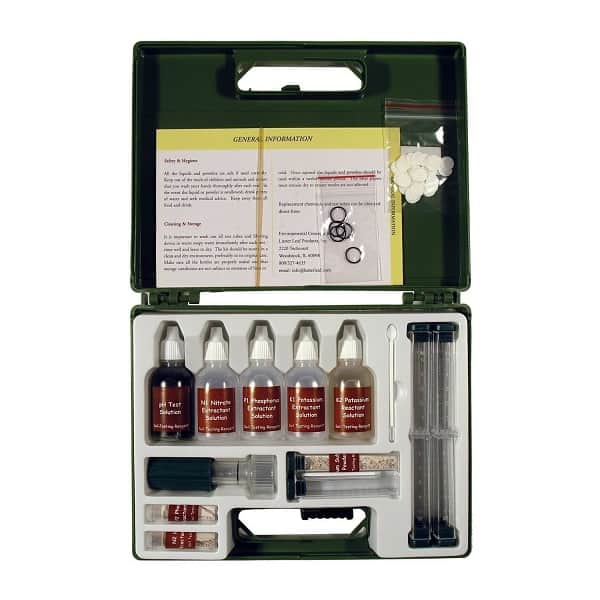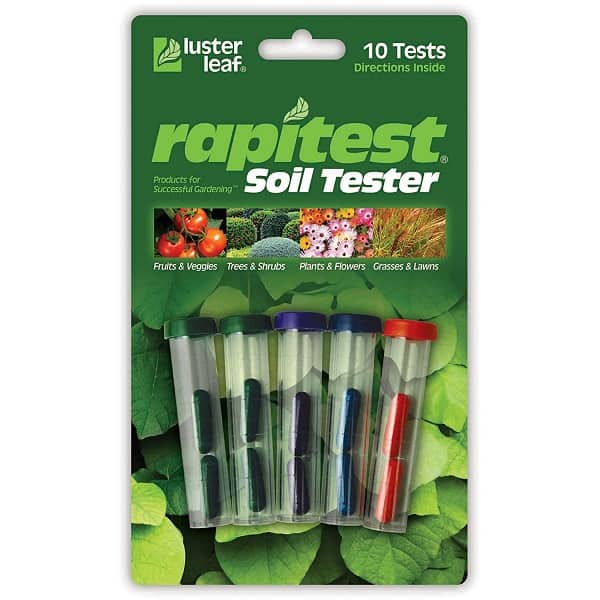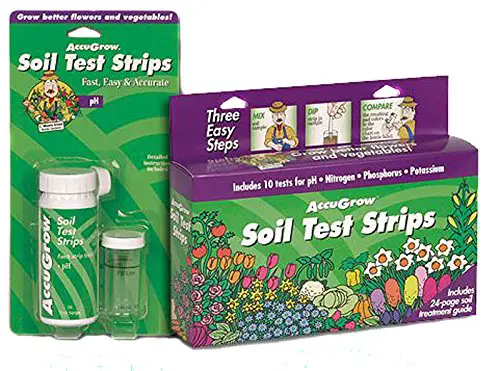[GUIDE] An Introduction to Soil pH Tester Kits
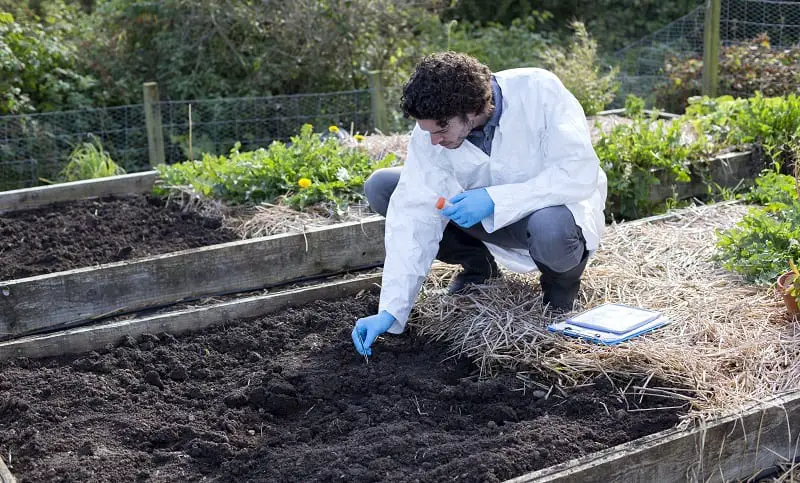
Testing soil will give you peace of mind, and maximum plant health and productivity
Quick Navigation
NOW THAT YOU HAVE the spot picked out for your garden and have it all cleared and ready to go, the next step is to determine the quality of the soil.
You can, of course, take a small sample and send it off to the UMass Soil and Plant Tissue Testing Lab for analysis. But this can take a lot of time and be a little expensive. A much better option is to use a soil pH tester kit and do it yourself.
So let's take a look at what you should be looking for in a soil pH test kit to make sure you don't waste your money. Before you rush out to the nearest garden center or department store.
Why You Need a Soil pH Tester Kit
In short, maintaining the proper pH balance of your soil is vital to the healthy growth of everything you plan to plant in your garden.
For example, if your garden has a high level of calcium in it, the soil will be more alkaline. On the other hand, if there is a high level of phosphorus in your soil, it will be more acidic.
Most plants require certain amounts of each in order to flourish. However, if the soil is too acidic or alkaline, your plants will not thrive and provide you with maximum harvest. This is the main reason why you need to buy a pH tester and keep a close eye on the pH balance of your soil.
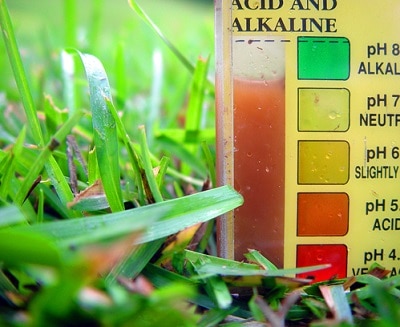
An example of a chemical colored dye soil ph tester kit
Three Different Types of Test Kits
There are, in fact, a total of three different types of soil pH test kits on the market today, pH strips, pH colored dyes, and electronic pH testers. The issue with strips and dyes however, is neither of them is capable of giving you accurate results you can rely on. You also need to buy every test you intend to do.
This leaves only the electronic pH testers. Electronic testers are able to provide you with almost instantaneous results that, depending on the brand/model you buy. They give you accurate results you can rely on. Also ph testers in this category are reusable. All you need to do to reuse the tester is to clean the soil off it.
One thing to keep in mind if you have never used a soil pH tester before is to be sure that the tester kit you get comes with a very complete set of instructions. Not only should the instructions tell you how to use the kit, but they should also tell you how to interpret the results. After all, not much good having a series of test results if you have no idea what they mean, right?
The instructions should also cover how to calibrate the tester to ensure you get the most accurate results possible. The problem here is that if you don’t get accurate results or are not sure how to interpret them, you can easily end up over or under-fertilizing your garden. This could leave you with a garden that does not produce the best possible results or worse yet a patch of ground full of dead plants.
Look for a Test Kit that Does More
If you want the best results, look for a soil pH test kit that does more than just measure the pH of the soil. A good testing kit will allow you to run at least four different tests on your soil.
The pH Level - the pH level of your soil should be between one and fourteen on the scale, with neutral soil sitting in the middle at a solid seven. Once you know whether your soil is acidic (under 7) or alkaline (over 7) you can adjust the type and amount of fertilizer you need to use.
Your Soil's Conductivity - Electrical conductivity is used to determine the level of naturally occurring nutrients currently in your soil. Once you have these figures, you can more accurately determine how much more fertilizer your soil needs.
Your Soil's Temperature - Different crops need different soil temperatures in order to germinate properly. You need to measure the temperature at the level you intend to plant the seeds. Rather than at the top which would be of no value with regard to helping your seeds to germinate and flourish.
Most, if not all quality seed packages will tell you the optimum soil temperature for best results.
The Level of Light - Plants all have their own very specific needs when it comes the right amount of sunlight for proper growth. Some pH tester kits have a built in light meter to help you determine how much sunlight each area of your garden receives on an average day.
I would recommend you buy a separate light meter if the kit you choose does not have one built in.
Using a a Kit
Using an electronic tester is relatively simple. Of course, the best way to make sure you are using yours the right way is to read the instructions that come with it.
The good news is that most pH testers are very similar, here are a few basic tips that should help you get started. They are common to a wide range of brands and models based on my experience.
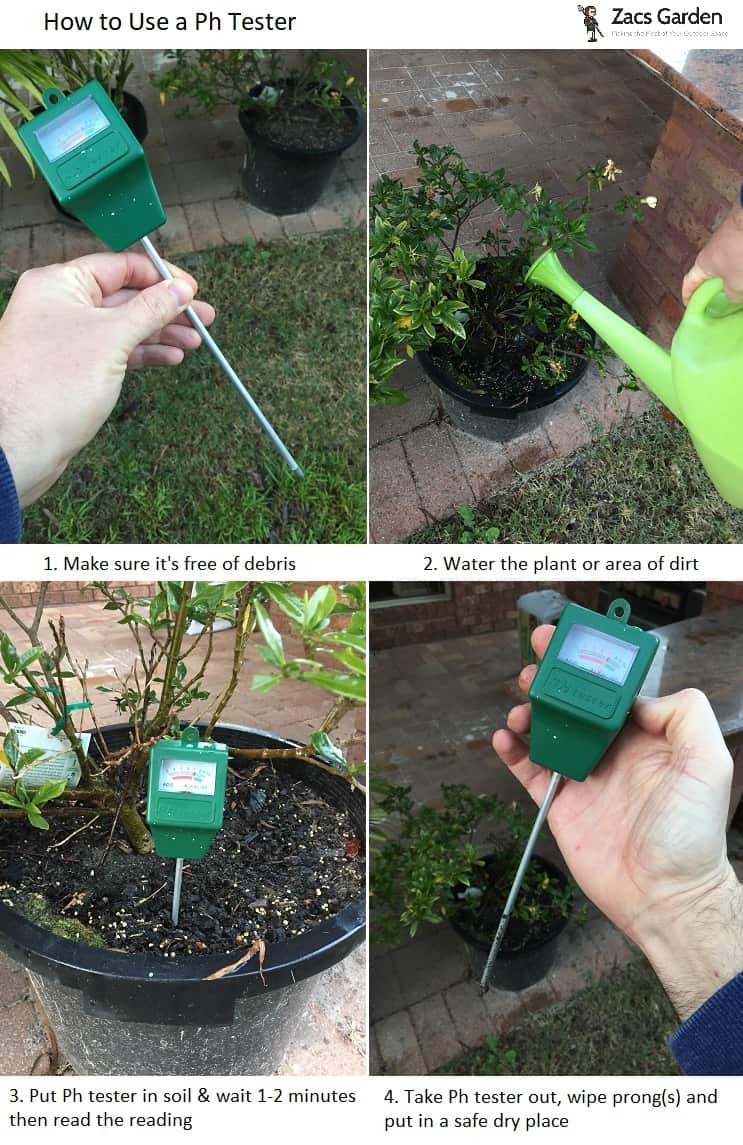
Here is a quick video that covers using an electronic pH test:
The Top 7 Soil pH Tester Kits
So now that you have a better idea of what you should be looking for in a ph test kit, let's take a quick look at my top seven picks and what I do and don't like about them.
Luster Leaf 1605 Rapitest Digital Soil Testing Kit
Easy to read LED display and push button simplicity
LUSTER LEAF 1605 Rapitest Digital Soil Testing Kit
This pH tester is one of the more popular units on the market today and features a bright easy to read LED display rather than a meter. It will test for pH, phosphorus, nitrogen, and potash levels.
In the kit, you will find information covering the pH level requirements of more than 450 plants to help you make the right adjustments. The tester performs 25 tests, including 10 pH and 5 nitrogen, potash, and phosphorus.
| Pros | Cons |
| Inexpensive | Tester does not work for all pH |
| Easy to follow instructions | Displays either highest or lowest pH values |
| Easy to use and is not messy | May be inaccurate |
Kelway PHD Soil pH Meter
Simple to use, just stick in soil and read the results
While this meter is used only to measure the pH of your soil, what attracted me to it is the fact it is so simple to use.
All you have to do is dig a hole in your garden that measures 3 - 4 inches across and approximately 5 inches deep. Fill the hole with water and let it drain out. Stick the tester in the soil and wait for the results, nothing could be easier.
| Pros | Cons |
| One of the simplest pH testers to use | Only gives pH readings nothing more |
| Easy to keep clean | Takes up to 5 minutes for an accurate reading |
| Meter is quite accurate | Soil must be wet for it to work |
Environmental Concepts pH7 Dual Probe Soil PH Meter
Dual probes for more accurate readings
ENVIRONMENTAL CONCEPTS pH7 Dual Probe Soil PH Meter
This pH tester has dual probes designed to give you a much more accurate set of readings.
The best part is that it does not require you to run out and buy a new set of batteries each spring. However, according to the instructions, you need to take a sample of your soil, place it in a container, and add distilled water to test it.
If you attempt to stick the probes directly into the ground, they may break. If your soil is freshly tilled and loose, this should not be a problem.
| Pros | Cons |
| Readings are ready after one minute | Probes may break off |
| Ready to use straight out of the box | Container method works but freshly tilled soil offers better results |
| Very inexpensive | Accuracy issues |
Imurz 3-in-1 Soil Moisture Meter
Test pH, moisture, and light in one easy to use tester
imurz 3-in-1 Soil Moisture Meter
This nifty little dual probe device tests the pH of your soil, its moisture content, and the all-important amount of light each area of your garden receives during the day. It never needs a battery and has been tested to be scientifically accurate.
The single switch lets you choose between light, moisture, and pH modes. Not only can you use this tester out in the garden, but you can also use it indoors to help ensure you are not over-watering your plants.
| Pros | Cons |
| Can be used indoors and outdoors | Not good for succulents |
| Does not require batteries | Meter features tiny fonts and can be hard to read |
| Dual probes for better accuracy | Suffers from low accuracy readings |
Environmental Concepts 1662 Professional Soil Test Kit with 40 Tests
A very comprehensive soil pH tester kit
ENVIRONMENTAL CONCEPTS 1662 Professional Soil Test Kit with 40 Tests
While this little soil tester kit may be listed as being for use in the field or schools, it is one of the highest rated kits on the market. It comes complete with a handy and very durable case as well as one of the most comprehensive instruction manuals available.
This kit will give you extremely accurate results that will help you get the most out of your garden. The kits ease of use and highly accurate results make it one of the best on the market.
| Pros | Cons |
| All tests are easy to complete | The plastic filtration unit comes apart at the seam |
| Comes with comprehensive instruction manual | Chemical tests may not be the best choice for some gardeners |
| Provides rapid results | The plunger system is challenging to use |
Rapitest Premium Soil Test Kit Lawn Flower Plant Test Garden Tester
Affordable chemical pH tester kit with a lot to offer
RAPITEST Premium Soil Test Kit (80 Test Kit 1663)
This is yet another field pH soil tester kit that can be used by amateur gardeners, professionals, and in the classroom. It can be used to test for pH, nitrogen, phosphorus, and potash levels. Comes in a sturdy plastic carrying case and includes enough chemicals for you to complete up to 80 tests - 20 for each category of testing.
The kit also includes a set of easy to read comprehensive testing instructions. While using this type of tester may be a bit time consuming the results are well-worth the effort.
| Pros | Cons |
| Very accurate results | Time consuming |
| Tests more than just pH | Does not test for light levels |
| Comes with everything you need for 80 tests | A little messy to use |
Luster Leaf Rapitest Soil Tester 1609CS
Low-cost soil pH tester kit that does more
LUSTER LEAF Rapitest Soil Tester 1609CS
This low-cost soil pH tester kit comes with enough supplies for a total of ten tests. This includes 4 x pH, and 2 x nitrogen/phosphorus/potash.
Each of the test tubes is color coded to ensure that you use the right ones for each test and to ensure accurate results. Comes with a set of easy to read and understand instructions.
Test results will make it easy for you to verify the condition of your soil and amend it as needed so that your garden will flourish all year long.
| Pros | Cons |
| Low cost | Suffers from accuracy issues |
| Easy to use | Messy to use |
| Comes with everything you need | Very small test tubes not for those with big hands |
One Other Option You Might Consider
While most types of soil pH test strips tend to be less than ideal, they are very easy to use and as long as you buy a top-quality kit can give you the results you are looking for in just a few minutes.
AquaChek AccuGrow 571802 pH, Nitrogen, Phosphorus, Potassium Soil Test Strips
Simple, fast, and accurate results
AQUACHECK AccuGrow 571802 pH Soil Test Strips
You can use these test strips to test your soil for pH, nitrogen, phosphorus, and potassium. They provide you with accurate results in minutes.
The kit comes with a comprehensive guide to soil amendment. There are no chemicals to worry about, no test tubes, and no equipment to worry about losing. All you have to do is dip the strip into damp soil and the strips do all the work.
The Final Test... (in Conclusion)
Nothing is more important to having a highly successful garden than having soil with the proper pH balance and nutrient levels. Each of the above-listed soil pH tester kits and devices will do the job for you and provide you with reasonably accurate results.
For myself, I have to admit I use the kit from Environmental Concepts as I find it gives me the most accurate results.
If you have enjoyed reading about the 7 best soil pH tester kits please let me know.
If you have any information you would like to see here, please contact us here.
Let everyone know you enjoyed reading this on Facebook, Twitter, and Pinterest.
Thank you for reading this.

